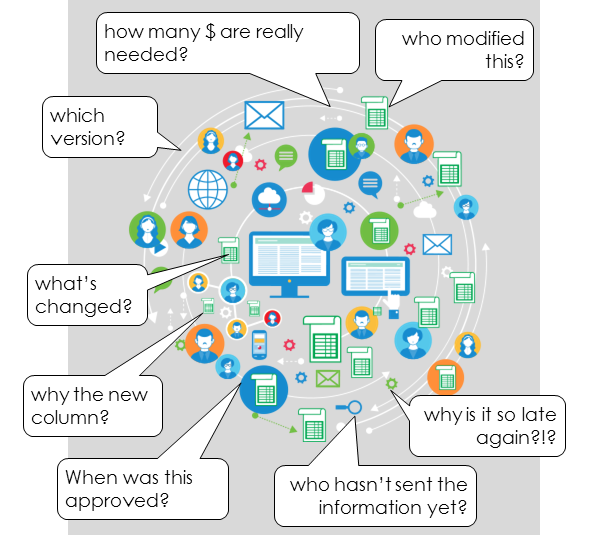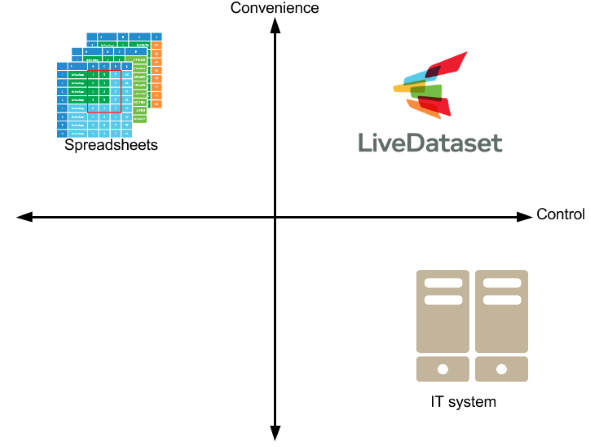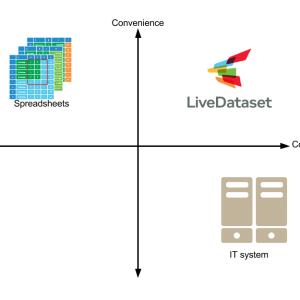The main business processes for every large organization are well supported by the core IT systems. Outside those systems employees are using thousands of spreadsheets for organizing information and simple business processes.
Between the core IT systems and simple spreadsheets is a plethora of small systems and complex spreadsheets that have sprung up organically to meet tactical or short-term objectives.

From an IT perspective there would ideally be a clean line between core IT systems and personal spreadsheets. But in reality there is a grey area where IT systems and spreadsheets overlap.
Spreadsheets and IT systems have their advantages and disadvantages. There is a trade-off between control and convenience.
- Spreadsheets offer convenience without control.
- IT systems provide control without convenience.

Spreadsheets Offer Convenience without Control
Spreadsheet can be very flexible and quick to start, but there is a danger they will eventually turn into spreadsheet beasts.
Spreadsheet software only includes a rudimentary form of control. By default everyone can see and change everything. You can protect some ranges with a password, but this means
- People with the password can change anything.
- People can share the password.
- There is no way of knowing who made what changes and when.
- You cannot allow some people to change one part of the data and other people to change another part.
Aside from the simplest use cases, spreadsheets effectively provide zero control for managing people’s access to the data.
One reason spreadsheets are so convenient is that all the data and logic are provided together in one place. Spreadsheets cells contain data and formulae, all mixed together. For control purposes, you need to be able to give access to update data without giving access to the business logic.
IT Systems Provide Control without Convenience
Defining and building ‘control’ into an IT system takes time — it’s inconvenient. The user interface may be less polished than professional software but more importantly it is less flexible.
One of the main reasons bespoke systems are less flexible is they are specifically designed to meet what the client asks for.
The IT team developing the system take their understanding of what is needed from the client. But in practice the client does not know exactly what they want until after the system has been built and they have been using it for real.
So IT have to go back and make changes. Adjusting the database, redesigning screens, rewriting code, creating scripts to transform old data for the new design, testing, and making it live. This all takes a long time, especially if the extra work needs to go through a lengthy justification and approval process.
IT systems can provide strong control because there is a rigid separation between IT people who have access and technical skills to change the business logic and business users who can update data.
When is Control Important? When is Convenience Important?
There is a spectrum with control at one end and convenience at the other. At one end control is essential and outweighs the need for convenience. At the other convenience is the most important factor.
| Control is important for | Convenience is important for |
|---|---|
|
|
For most situations, you want both control and convenience.
LiveDataset Offers Control AND Convenience
The LiveDataset team have been building business applications for decades and are very familiar with the control vs. convenience challenge.
So LiveDataset was designed to provide the ideal combination of convenience and control.
You can start immediately using LiveDataset like a spreadsheet. It is easy to adjust and make the changes you want.
When you want to share datasets with other people, you can add the control you want. You can add strict controls like an IT system – or relaxed controls. It is your choice.
You can separately give people access to change the business logic or the data – and they do not need complex technical skills.
Whatever business rules you want you can do it quickly and change it quickly too. Total convenience and full control.

